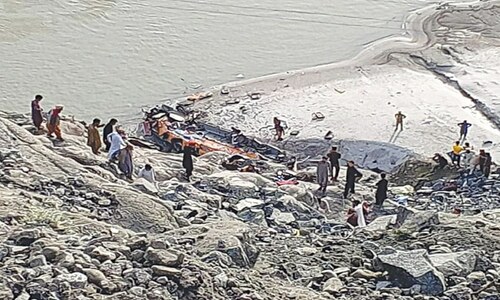ISLAMABAD: After four-month suspension of polio vaccination activities because of the Covid-19 restrictions, it has been decided to resume small-scale polio vaccination activities from July 20.
The door-to-door campaigns in selected districts will also be utilised for creating awareness about Covid-19 preventive measures and antenatal care services for mothers and children.
The areas to be covered in the first round are Faisalabad, Attock, South Waziristan, and parts of Karachi and Quetta with a target to vaccinate almost 800,000 children under the age of five.
In Quetta, special vaccination campaigns would be launched in 10 union councils during which 110,000 children would be administered polio drops.
A statement says that under the guidance of the Ministry of Health and following the Global Polio Eradication Initiative (GPEI) guidelines and Polio Oversight Board recommendations, the Pakistan Polio Eradication programme had suspended all polio related activities in the last week of March, except surveillance.
In the meanwhile, all programme strengths and capacities were redirected to support the ongoing Covid-19 surveillance and response efforts at different levels.
The programme has been vigilantly monitoring the evolving risks of Covid-19 as well as polio and other vaccine preventable diseases across Pakistan. The suspension of immunisation activities due to lockdowns, closure of outpatient departments (OPDs) and travel difficulties disrupted essential health interventions.
“The provisions of essential vaccines to around 700,000 newborns per month were seriously affected while the suspension of door to door campaigns also widened immunity gap among vulnerable children significantly diluting the gains made during December 2019 to March 2020 as the programme was recovering from the 2019 crisis. The country is, thus, facing widespread circulation of WPV1 and cVDPV2 [vaccine derived polio virus] with heightened risks across Pakistan,” it states.
“The impact of Covid-19 on our economy and communities is unprecedented. With the disruption of essential immunisation services due to the Covid-19 pandemic, children are continuously at a higher risk of contracting polio and other vaccine-preventable diseases,” said Special Assistant to the Prime Minister on Health Dr Zafar Mirza.
“As we learn to live with Covid-19, I urge all parents and caregivers to ensure vaccination of their children to protect them from all vaccine-preventable diseases, including paralysing polio. Ensuring safe vaccination and well-being of children is our utmost priority,” he said.
The resumption plan prepared by the national team in consultation with provinces was presented to and endorsed by the Technical Advisory Group (TAG) on Polio Eradication in Pakistan during a meeting in June advising robust safety measures. The plan encompasses large scale case response rounds in August and September and three nationwide campaigns during last quarter of 2020.
The meeting of the National Command and Operations Centre held on July 4, chaired by the prime minister, and having all chief secretaries on board, appreciated resumption of essential immunisation services and urged all stakeholders to urge the optimal quality of supplemental immunisation activities envisaged in the plan to resume polio immunisation activities, the statement claims.
“We are initially aiming to target areas with continuous poliovirus circulation to protect children against crippling polio disease during this case response. Staff are being specially trained on preventive measures to be followed during vaccination, including protocols of door-knocking and marking, keeping the desired physical distance inside homes, and ensuring safe handling of a child while vaccinating and finger marking,” said Dr Rana Mohammad Safdar, Coordinator of the National Emergency Operations Centre, Polio Eradication programme.
“The door-to-door campaigns will also be utilised to raise awareness on Covid-19 preventive measures and referring mothers and children for other essential vaccinations as well as the antenatal care services,” he further said while requesting support of all segments of society, particularly parents.
Pakistan is one of two polio-endemic countries in the world along with its neighbour Afghanistan. Pakistan is currently facing a challenging situation in polio eradication with the upsurge of polio cases. In the current year so far, a total of 58 polio cases have been reported, including 21 from Khyber Pakhtunkhwa, 20 from Sindh, 14 from Balochistan and three from Punjab.
Polio is a highly infectious disease caused by poliovirus mainly affecting children under the age of 10 years. It invades the nervous system, and can cause paralysis or even death. While there is no cure for polio, vaccination is the most effective way to protect children from this crippling disease. Each time children under the age of five are vaccinated, their protection against the virus is increased. Repeated immunisations have protected millions of children from polio, allowing almost all countries in the world to become polio free.
Saleem Shahid in Quetta also contributed to this report
Published in Dawn, July 13th, 2020















































Dear visitor, the comments section is undergoing an overhaul and will return soon.